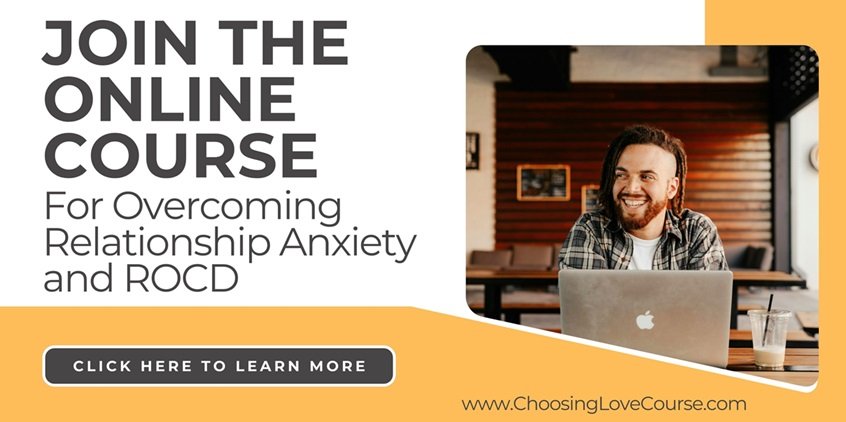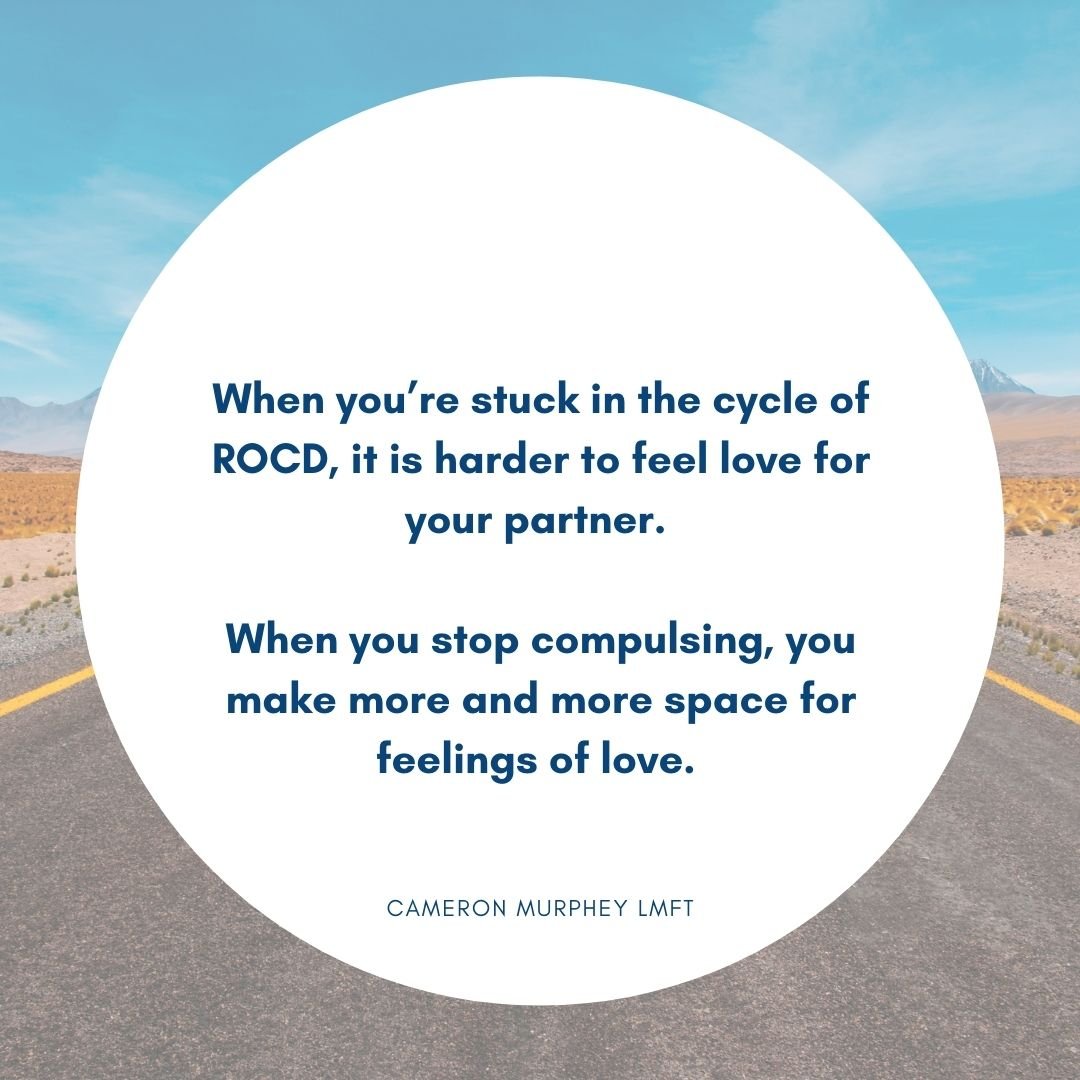Is it ROCD or Am I Not in Love?
“Is it ROCD or am I not in love?” You feel anxious about your relationship. You don’t know if this is anxiety from ROCD or a sign that you’re not in love. How can you tell the difference?
In this post, I give you some ideas on how to answer the question, “Is this ROCD or am I not in love?”
I also point out when asking this question becomes a compulsion. Stopping compulsions is one of the most important parts of ROCD treatment, since compulsing makes ROCD worse.
How to recognize ROCD
I wrote in another post how to recognize ROCD. To recap, ROCD involves a cycle of obsessing, distressing, and compulsing.
Obsessing
Obsessing involves worrying, and it typically comes in the form of “What if” thoughts. For example:
What if I’m not in love with my partner?
What if I’m in the wrong relationship?
What if I fall out of love with my partner?
What if I’m in denial about not loving my partner?
How do I know I’m actually in love with my partner?
How do I know I’ll always love my partner?
Distressing
ROCD brings an intense amount of distress. I know from personal experience how anxious you can feel from relationship OCD. The anxiety can be so strong that some people even struggle to eat or sleep. It’s an outright miserable experience to have ROCD.
A lot of this distress comes from fear of a worst case scenario. For example, someone with ROCD might think, “If I’m not in love with my partner, then I’ll have to break up with them.” This causes a ton of distress, which only intensifies the “What if” obsessions.
Compulsing
Compulsing is any attempt to answer the “What if” questions and achieve certainty. When you compulse, you’re trying to figure out for sure whether this is ROCD or you’re in love. Examples of compulsing include:
Monitoring how attracted you feel to your partner (Checking)
Asking other people how they know they’re in love (Seeking reassurance)
Googling how to know if you’re in love (Seeking reassurance)
Looking for proof that you love your partner (Checking/Seeking reassurance)
Not sure if you have ROCD? Take my free ROCD test to find out.
ROCD is a cycle
Compulsing can bring temporary relief, but never for long. Sooner or later, a person with ROCD falls back into obsessing and distressing.
This is the cycle of ROCD: obsessing, distressing, and compulsing. This holds true for every person with relationship anxiety who I’ve worked with.
Recognizing this cycle in the moment is one of the surest ways to know that you’re struggling with ROCD.
“But how do I know I’m in love?”
When you’re stuck in the cycle of ROCD, it is harder to feel love for your partner. So much of your attention is consumed with obsessing, distressing, and compulsing. It’s only natural that your heart wouldn’t be open to feelings of love.
Fortunately, love is more than a feeling. Real love exists in our choices and actions. For example, when I was struggling with relationship anxiety and doubting whether I loved my partner, I realized that I was still doing things that expressed how much I loved her: doing the dishes, buying her gifts, making extra food for the week.
So, ask yourself what you do for your partner that you wouldn’t do for anyone else. This is likely a sign that you love this person.
“Shouldn’t I feel infatuated?”
It’s normal to not feel infatuated with someone you love. Infatuation is more common in the early stages, if it appears at all. Infatuation is also more common in unhealthy relationships, so don’t put much importance on whether you feel infatuated with your partner.
Don’t let your ROCD convince you that you need to feel infatuated to be in love. Remind yourself that infatuation is superficial, and usually based in our own fantasies about the other person. Mature love is deep and stable, and usually feels less exciting.
“I want to be 100% certain that I’m in love”
This line of thinking is probably compulsing, and it’s a good example of ROCD in action. Remember: compulsing is any attempt to eliminate uncertainty and risk. When you try to know for certain that you’re in love, you’re probably compulsing.
Clients often say, “But other people know for certain. They say things like ‘I knew from the moment I met her that she was the one for me.’”
It’s so important to understand this: people who don’t have ROCD have a way lower bar for “knowing” they’re in love. People with ROCD are generally more intelligent, and more prone to doubting things. Someone with relationship OCD is more likely to question whether they really feel in love.
It’s also important to understand that the more you check, the less certain you become. This is another way in which compulsing adds to the cycle of ROCD, rather than solving it.
What successful ROCD treatment looks like
ROCD treatment helps you to stop compulsing and learn to accept uncertainty. When you stop compulsing, you interrupt the cycle of obsessing-compulsing that keeps ROCD alive. And when you learn to live with uncertainty, you find the courage to choose love.
Also, as you take your ROCD less seriously and cut through the cycle of obsessing-compulsing, more of your attention becomes available to feeling love for your partner. When you stop compulsing, you make more and more space for feelings of love.
People who recover from ROCD develop a courage they never knew they had before. They say things like:
I think I love my partner. I know I can’t know with 100% certainty, but I’m going to bet on it.
I choose to love my partner. Love is more than a feeling; it’s also a choice.
ROCD is trying to trick me into doubting again. I’m not buying it.
In this way, ROCD treatment is so much more than feeling less anxious. I watch my clients grow into better versions of themselves, becoming more willing to take risks in pursuit of love.
So, be patient with yourself. Feelings of love wax and wane - this is normal. Don’t let your ROCD bully you into doubting whether you love your partner. Focus on stopping compulsing and learning to live with uncertainty.
Meet Cameron
I help men and women do the personal work needed to overcome ROCD and have healthy, happy relationships. I work with people who are experiencing relationship anxiety for the very first time, or who have struggled with it for years.
I know firsthand how difficult relationship anxiety can be. The anxiety and worry can feel constant, and you wonder if you’ll feel like this forever.
Fortunately, I know that there’s also a way out. My job is to help guide you through ROCD and find the courage to choose love.
Check out my online course! It’s on-demand, and includes over 3 hours of audio and 10 skills and tools to use in overcoming ROCD.
Or reach out for a free consultation to see if we’re a good fit for therapy.
I meet with clients in person in Oakland, CA, and online throughout the state of California.




